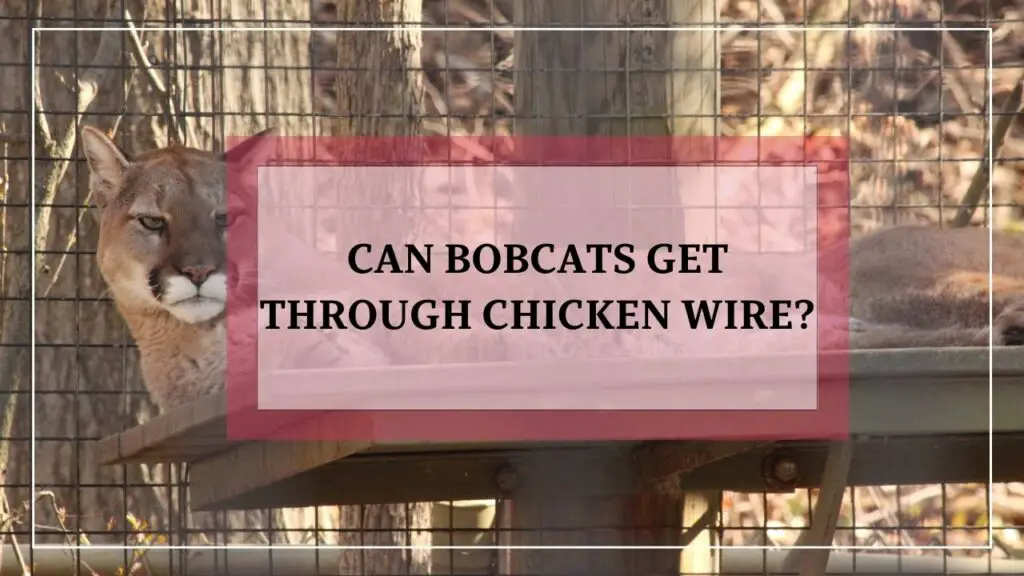Bobcats are native to North America and are known for their hunting abilities. While they typically prey on small animals, they have been known to attack poultry and other livestock, especially when food is scarce. This has led many farmers and homeowners to wonder if chicken wire, a popular method for protecting chickens, is enough to keep these predators at bay.
In this article, we will explore the question of whether or not bobcats can get through chicken wire, what factors determine the durability of chicken wire, and what alternatives exist for bobcat protection.
After reviewing available literature, conducting research, and considering various factors, it can be concluded that whole chicken wire can provide some level of protection against bobcats, but it is not always enough.
The durability of chicken wire can vary greatly based on its gauge, mesh size, and material used, and therefore, it is important to consider these factors when choosing a barrier to protect livestock and poultry.
Can Bobcats Get Through Chicken Wire?


Chicken wire, also known as poultry wire, is a type of wire mesh that is commonly used to protect chickens and other poultry from predators. However, it is important to note that the durability of chicken wire can vary greatly based on its gauge, mesh size, and material used.
Bobcats are strong and agile predators, capable of climbing trees, jumping over obstacles, and breaking through barriers. While they are not as large as some other predators, such as mountain lions, they still pose a significant threat to poultry and livestock.
So, can bobcats get through chicken wire?
Physical Characteristics Of Bobcats
Bobcats are known for their strength and agility, which allows them to navigate their environment and catch prey. They are equipped with sharp claws, strong legs, and powerful jaws, making them formidable predators. In addition, bobcats are known for their ability to climb trees, jump over obstacles, and dig through barriers.
The Ability Of Bobcats To Penetrate Chicken Wire
The ability of bobcats to penetrate chicken wire depends on several factors, including the durability of the wire, the behavior of the bobcats, and the specific situation. In general, chicken wire with a smaller mesh size and a thicker gauge may be able to provide adequate protection against bobcats. However, if the wire is not sturdy enough, the bobcats may be able to penetrate it.
It is also important to consider the behavior of bobcats in your area. For example, if bobcats are known to climb trees and jump over obstacles to access prey, a taller barrier may be necessary. Additionally, if bobcats are known to dig under barriers, a barrier that extends underground may be necessary to provide adequate protection.
Factors that Determine the Durability of Chicken Wire
When it comes to protecting poultry and livestock from bobcats, choosing the right chicken wire is key. The durability of chicken wire can greatly impact its effectiveness in deterring bobcats. There are several factors that determine the durability of chicken wire, including:
1. Wire Gauge
The wire gauge refers to the thickness of the wire used to make the mesh. The lower the gauge number, the thicker the wire. Thicker wire will generally be stronger and more durable, making it better able to withstand the strength and agility of bobcats. It is recommended to choose chicken wire with a gauge of 19 or lower to ensure adequate protection against bobcats.
2. Mesh Size
The mesh size refers to the distance between the wires in the mesh. A smaller mesh size will result in smaller holes in the wire, making it more difficult for predators to penetrate. When choosing chicken wire to protect against bobcats, it is recommended to choose a mesh size of 1 inch or smaller.
3. Material
The material used to make the chicken wire can also impact its durability. Galvanized steel is the most common material used for chicken wire and is known for its affordability and versatility. However, it is important to choose high-quality galvanized steel to ensure that the wire is strong and durable enough to withstand the strength and agility of bobcats.
How to Determine if Chicken Wire is Strong Enough to Keep Bobcats Out
If you’re looking to protect your poultry and livestock from bobcats, choosing the right chicken wire is crucial. To determine if your chicken wire is strong enough to keep bobcats out, consider the following factors:
Consideration Of The Bobcat Population In The Area
If there is a high population of bobcats in your area, you may need to choose a stronger barrier to protect your poultry and livestock. It may be necessary to choose a stronger chicken wire with a lower gauge, smaller mesh size, and high-quality materials.
Examination Of The Chicken Wire
Examining the chicken wire you have or are considering purchasing is also important in determining its strength against bobcats. Check the wire gauge, mesh size, and material used. If the wire gauge is low, the mesh size is small, and the material is high-quality, it is more likely that the chicken wire will provide adequate protection against bobcats.
Consideration Of The Behaviours Of Bobcats In The Area
Consideration of the behaviors of bobcats in your area is also important in determining if your chicken wire is strong enough. If bobcats in your area are known to climb trees and jump over obstacles, you may need to choose a taller barrier. If they are known to dig under barriers, you may need to choose an underground barrier.
Alternatives to Chicken Wire for Bobcat Protection
If you are concerned that chicken wire may not provide adequate protection against bobcats, there are several alternatives to consider. These alternatives include:
Hardware Cloth
Hardware cloth is a stronger and more durable alternative to chicken wire. It is made of heavy-duty wire that is more difficult for predators to penetrate. Hardware cloth is also available in a variety of gauges and mesh sizes, making it a versatile option for bobcat protection.
Welded Wire Fencing
Welded wire fencing is another option for bobcat protection. This type of fencing is made of welded wire panels that are difficult for predators to penetrate. Welded wire fencing is also available in a variety of gauges and mesh sizes, making it a versatile option for bobcat protection.
Electric Fencing
Electric fencing is another option for bobcat protection. This type of fencing uses electric shock to deter predators from entering the area. Electric fencing can be an effective option for bobcat protection, but it is important to choose a high-quality fence that is designed specifically for predator control.
FAQs
What Animals Can Rip Through Chicken Wire?
Many wild and domestic animals can rip through the chicken wire if it is not strong enough or if they are motivated to do so. Some of the most common animals that can rip through chicken wire include:
1. Bobcats: Bobcats are strong and agile predators that can climb trees, jump over obstacles, and break through barriers.
2. Coyotes: Coyotes are known to be persistent and resourceful predators that can break through the chicken wire if they are motivated to do so
3. Foxes: Foxes are known to be agile and able to climb over or dig under chicken wire barriers if they are motivated to do so.
4. Raccoons: Raccoons are known to be clever and able to find ways to break through the chicken wire if they are motivated to do so.
What Can Break Through Chicken Wire?
Chicken wire is not a foolproof barrier, and several factors can contribute to its vulnerability. Some of the most common causes of chicken wire failure include:
1. Age: Over time, chicken wire can become weakened and brittle, making it easier for predators to rip through.
2. Weather: Weather can also cause the chicken wire to become weakened and more vulnerable to damage from predators.
3. Improper installation: If the chicken wire is not installed correctly, it can be more vulnerable to predators.
4. Poor quality: Low-quality chicken wire can be easily ripped through by predators.
How Do I Keep Bobcats Away From My Chickens?
To keep bobcats away from your chickens, there are several steps you can take. Some of the most effective methods include:
1. Choosing the right barrier: Chicken wire may not provide adequate protection against bobcats in all situations. Consider alternatives such as hardware cloth, welded wire fencing, or electric fencing.
2. Installing the barrier properly: Proper installation of the barrier is key to its effectiveness in deterring predators.
3. Storing feed securely: Storing feed securely can reduce the attraction of predators to your property.
4. Using motion-activated lights: Motion-activated lights can startle predators and deter them from approaching your property.
5. Seeking professional help: If you cannot keep bobcats away from your chickens, consider seeking the help of a professional wildlife control specialist.

